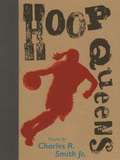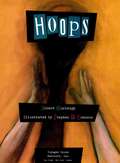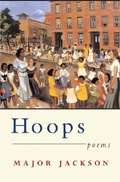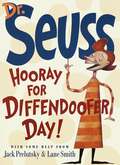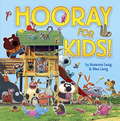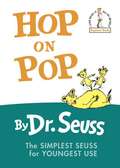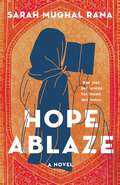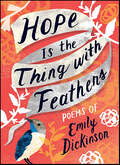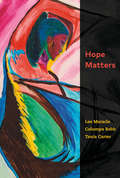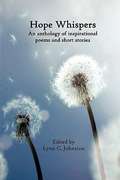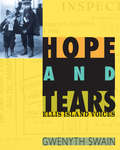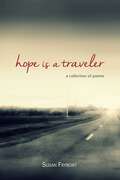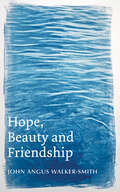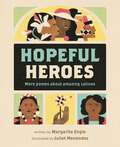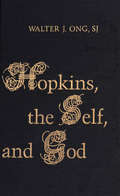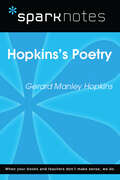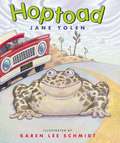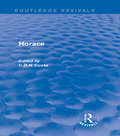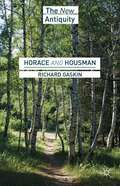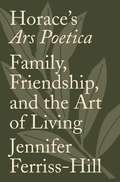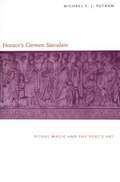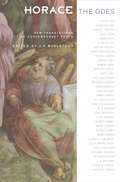- Table View
- List View
Hoop Queens
by Charles R. Smith Jr.Cheer on twelve professional women basketball players with a collection of vivid poems by Charles R. Smith Jr. set against vibrant photographs of the players in action. Seven-foot-two-inch Margo Dydek blocks shots like a "Fly Swatter." Ticha Penicheiro feeds the ball to her teammates like a "Chef ... mixing / and tossing / and chopping / and whipping." And then there's "Fire Starter" Chamique Holdsclaw, rapidly racking up points and "blazing a trail with moves that scorch." These are just three of the twelve women profiled by Charles R. Smith Jr. in a remarkable group of poems honoring the unique talents and determination of some of the best female players in professional basketball. With its arresting visual layout, action photographs on craft paper, and kinetic lyrics illustrating each player's style, HOOP QUEENS will grab the attention of any kid who loves basketball - and score a slam-dunk with teachers of poetry. The book's special cover treatment includes a cloth spine and cover stamping, giving a textured feel.
Hoops
by Robert BurleighIllustrations and poetic text describe the movement and feel of the game of basketball.
Hoops: Poems
by Major JacksonMajor Jackson continues to mine the solemn marvels of ordinary lives. The substance of Jackson's art is the representation of American citizens whose heroic endurance makes them remarkable and transcendent.
Hooray for Diffendoofer Day!
by Dr Seuss Jack Prelutsky Lane SmithThe curriculum is quite different--laughing and yelling--and the staff is creative and zany. But will the kids score high enough on the achievement test to keep their little school open? This book celebrates individuality and provides a good forum for parents and kids to talk about what are the important things which must be learned. Other books by Dr. Seuss and Jack Prelutsky are also available from Bookshare. This file should make an excellent embossed braille. copy.
Hooray for Kids!
by Suzanne Lang illustrated by Max LangEvery kid is a one-of-a-kind kid! Suzanne and Max Lang (Families, Families, Families!) bring us another joyful ode to diversity in this zippy rhyming celebration of kids of all stripes. Whether you're a play-a-lot-of-ball kid, a hang-out-at-the-mall kid, a bake-delicious-pie kid, or an always-asking-why kid . . . when you read this book, you'll be a laughing-till-you-cry kid! Children can find themselves in the hilarious menagerie and recognize their friends and classmates. The subtle anti-bullying message will make this a welcome addition to classroom libraries.
Hop Up! Wriggle Over!
by Elizabeth Honey“Hop up! Wriggle over! Wakey-wakey: hungry!” Thus starts a full and busy day for an appealing animal family. Simple onomatopoeic words and irresistible illustrations capture familiar routines in a young read-aloud containing a warm and subtle reminder that families come in all shapes and sizes.
Hop on Pop
by Dr SeussLoved by generations, this "simplest Seuss for youngest use" is a beginner book classic. See Red and Ned and Ted and Ed in a bed. And giggle as Pat sits on a hat and on a cat and on a bat... and almost sits on a cactus! Pat must NOT sit on that! All images are described. Originally created by Dr. Seuss, Beginner Books encourage children to read all by themselves, with simple words and illustrations that give clues to their meaning.
Hope Ablaze: A Novel
by Sarah Mughal RanaShe lost her words but found her voice.All My Rage meets The Poet X in this electric debut that explores a Muslim teen finding her voice in a post-9/11 America.Nida has always been known as Mamou Abdul-Hafeedh’s niece - the poet who will fill her uncle’s shoes after he was wrongfully incarcerated during the war on terror. But for Nida, her poetry letters are her heart and sharing so much of herself with a world that stereotypes her faith and her hijab is not an option.When Nida is illegally frisked at a Democratic Senatorial candidate’s political rally, she writes a scathing poem about the politician, never expecting the letter to go viral weeks before Election Day. Nida discovers her poem has won first place in a national contest, a contest she never entered, and her quiet life is toppled. But worst of all, Nida loses her ability to write poetry. In the aftermath of her win, Nida struggles to balance the expectations of her mother, her uncle, and her vibrant Muslim community with the person she truly wants to be. With a touch of magic and poetry sprinkled throughout, Sarah Mughal Rana's Hope Ablaze is heartbreaking, often funny, and ultimately uplifting, not only celebrating the Islamic faith and Pakistani culture, but simultaneously confronting racism and Islamophobia with unflinching bravery.
Hope Is the Thing with Feathers: Poems of Emily Dickinson
by Emily DickinsonFrom the Women's Voices series, a collection of classic poetry specifically curated to encourage, challenge, and motivate women.One of American’s most distinctive poets, Emily Dickinson scorned the conventions of her day in her approach to writing, religion, and society. Hope Is the Thing with Feathers is a collection of her vast archive of poetry to inspire the writers, creatives, and feminists of today.“Emily Dickinson is one of our most original writers, a force destined to endure in American letters. . . . Without elaborate philosophy, yet with irresistible ways of expression, Emily Dickinson’s poems have true lyric appeal, because they make abstractions, such as love, hope, loneliness, death, and immortality, seem near and intimate and faithful.” —The AtlanticWomen's Voices seriesJane Eyre by Charlotte BronteThe Feminist Papers: A Vindication of Rights of Women by Mary WollstonecraftThe Yellow Wallpaper and Other Writings by Charlotte Perkins GilmanHope Is the Thing with Feathers: Poems by Emily Dickinson
Hope Matters
by Lee Maracle Columpa Bobb Tania CarterThroughout their youth, Columpa Bobb and Tania Carter wrote poetry with their mother, award-winning author Lee Maracle. The three always dreamed that one day they would write a book together. This book is the result of that dream.The wide-ranging poems in Hope Matters focus on the journey of Indigenous peoples from colonial beginnings to reconciliation. But they also document a very personal journey—that of a mother and her two daughters.Written collaboratively, Hope Matters offers a blend of three distinct and exciting voices that come together in a shared song of hope and reconciliation.
Hope Matters
by Lee Maracle Columpa Bobb Tania CarterHope Matters, written by multiple award-winner Lee Maracle, in collaboration with her daughters Columpa Bobb and Tania Carter, focuses on the journey of Indigenous people from colonial beginnings to reconciliation.Maracle states that the book, "is also about the journey of myself and my two daughters." During their youth, Bobb and Carter wrote poetry with their mother, and eventually they all decided that one day they would write a book together. This book is the result of that dream.Written collaboratively by all three women, the poems in Hope Matters blend their voices together into a shared song of hope and reconciliation.
Hope Whispers
by Lynn C. JohnstonDiscover the awesome power that hope and faith play in our physical, emotional and spiritual healing with this collection of more than 80 uplifting and life-affirming poems and short stories. Contributors include noted authors and poets Glenda Barrett, Perry P. Perkins,Lyn Halpern, Francine L. Billingslea, Linda O'Connell, Kathleen Gerard, Robert D. Fertig, Elaine Dugas Shea, Ed Roberts and many others.
Hope and Tears: Ellis Island Voices
by Gwenyth SwainAn original collection of voices, filled with hope and tears, chronicles the history of Ellis Island and the people it served. Indians, settlers, immigrants, inspectors, doctors, nurses, cooks, and social workers all played a big part in that history. Author Gwenyth Swain reimagines the lives of those who landed, lived, and worked on the island through fictional letters, monologues, dialogues, and e-mails, basing them on historical documentation and real-life people. In doing so, she creates a moving picture of their struggles and triumphs. <P><P> Illustrated with poignant and affecting photographs, this is a unique exploration of Ellis Island's history. Includes further resources, bibliography, and source notes.
Hope is a Traveler
by Susan FrybortIn this entrancing poetry collection, Susan Frybort reminds us of the glory that resides at the heart of everyday living. With poems that read like sacred correspondence between our hearts and our essence, we are called to remember the wonderment of life's ever changing tide. Whether it be in the call of a mourning dove, a contemplative shore, or a field of golden wild grass, the reader is left with no choice but to embrace hope in a transitory world.Written with a depth of insight and compassion seldom seen, this is the rarest of first collections. Love and nature poems coalesce like a reverential hymn to the beloved: the beloved at the heart of every breath, the beloved that calls to us as wind, the beloved that resides on the bridge between our hearts. Through Frybort's eyes, there is profound significance in all things perceived small. Absolutely everything is the beloved. Hope is a Traveler is a homage to the miracle of true being.
Hope, Beauty and Friendship
by John Angus Walker-SmithThis selection of poems by a new author was triggered by the tragic death of his 28-year-old daughter. So the collection begins with loss and the aftermath of loss: the hope of the author that his daughter and he may be reunited in the life to come. This hope underlies many of the poems. This is clearly articulated in ‘Osler and Son’, where a father grieves for loss of his son in World War I but in a stoical, unexpressed manner. The author records his childhood experience of emotions being held back in ‘Boys Don’t Cry John’. While some poems look back, most are contemporary, such as those inspired by the lockdown and the Ukraine War. The author advocates expression of feelings. This is powerfully expressed in relation to his experience of Friendship, both past and present. Transcendental beauty is a theme in the metaphysical poems ‘The Colour Blue’ and ‘Roman Glass’. However, each poem is unique. Many of them speak from the heart and have an emotional impact. The author hopes that these will resonate with readers.
Hopeful Heroes: More Poems About Amazing Latinos
by Margarita EngleIn this companion to Bravo!, Margarita Engle's beautiful poetry introduces young readers to lesser-known Latinos from varied backgrounds who have all shown tremendous resilience.Prepare to be inspired by this empowering collection of poetry that tells a larger story about fortitude and community across Hispanic history. From environmental activists such as Christina Figueres to record breaking athletes like Pelé, each role model featured is a legend in their own right. There’s no better time to champion the accomplishments of this remarkable group of unsung heroes from all across Latin America!Those profiled in this collection include Anacaona, Martín de la Cruz and Juan Badiano, Sor Juana Inés de la Cruz, Micaela Bastidas Puyucahua, Simón Bolívar, Mariana Grajales Cuello, Ana Roqué de Duprey, Julio Garavito Armero, Ramón Fonst Segundo, Christiana Figueres, Juano Hernández, Gabriela Mistral, Martín Chambi de Coaza, Marina Núñez del Prado, Noé Canjura, Nicolás García Uriburu, Pelé, and Rigoberta Menchú Tum.
Hopkins Self and God
by Walter J. OngIn these studies Professor Ong explores some previously unexamined reasons for Hopkins' uniqueness, including unsuspected connections between nineteenth-century sensibility and certain substructures of Christian belief.General Manley Hopkins was not alone among Victorians in his attention to the human self and to the particularities of things in the world around him, where he savoured the 'selving or 'inscape' of each individual existent. But the intensity of his interest in the self, as a focus of exuberant joy as well as sometimes of anguish, both in his poetry and his prose, marks him out as unique even among his contemporaries. In these studies Professor Ong explores some previously unexamined reasons for Hopkins' uniqueness, including unsuspected connections between nineteenth-century sensibility and certain substructures of Christian belief.Hopkins was less interested in self-discovery or self-concept than in what might be called the confrontational or obtrusive self - the 'I,' ultimately nameless, that each person wakes up to in the morning to find simply there, directly or indirectly present in every moment of consciousness. Hopkins' concern with the self grew out of a nineteenth-century sensibility which was to give birth to modernity and postmodernity, and which in his case as a Jesuit was especially nourished by the Spiritual Exercises of St Ignatius Loyola, concerned at root with the self, free choice, and free self-giving. It was also nourished by the Christian belief in the Three Persons in One God, central to Hopkins' theology courses and personal speculation, and very notable in the Special Exercises. Hopkins appropriated and intensified his Christian beliefs with new nineteenth-century awareness: he writes of the 'selving' in God of the Father, the Son, and the Holy Spirit. Hopkins' pastoral work, particularly in the confessional, dealing directly with other selves in terms of their free decisions, also gave further force to his preoccupation with the self and freedom. 'What I do,' he writes, 'is me.'Besides being concerned with the self, the most particular of particulars and the paradigm of all sense of 'presence,' the Spiritual Exercises in many ways attend to other particularities with an insistence that has drawn lengthy and rather impassioned commentary from the postmodern literary theorist Roland Barthes.Hopkins' distinctive and often precocious attention to the self and freedom puts him theologically far ahead of many of his fellow Catholics and other fellow Victorians, and gives him his permanent relevance to the modern and postmodern world.
Hopkins's Poetry (SparkNotes Literature Guide Series)
by SparkNotesHopkins's Poetry (SparkNotes Literature Guide) by Gerald Manley Hopkins Making the reading experience fun! Created by Harvard students for students everywhere, SparkNotes is a new breed of study guide: smarter, better, faster.Geared to what today's students need to know, SparkNotes provides:chapter-by-chapter analysis explanations of key themes, motifs, and symbols a review quiz and essay topics Lively and accessible, these guides are perfect for late-night studying and writing papers.
Horace
by Richard F. ThomasThe Carmen Saeculare was composed and published in 17 BCE as Horace was returning to the genre of lyric which he had abandoned six years earlier; the fourth book of Odes is in part a response to this poem, the only commissioned poem we know from the period. The hardening of the political situation, with the Republic a thing of the past and the Augustan succession in the air, threw the problematic issue of praise into fresh relief, and at the same time provided an impulse towards the nostalgia represented by the poet's private world. Professor Thomas provides an introduction and commentary (the first full commentary in English since the nineteenth century) to each of the poems, exploring their status as separate lyric artefacts and their place in the larger web of the book. The edition is intended primarily for upper-level undergraduates and graduate students, but is also important for scholars.
Horace (Routledge Revivals)
by C.D.N. CostaTwo thousand years after his death Horace is still recognised as a unique poet, having exerted marked influence on later European literature. This collection, first published in 1973, explores the different aspects of Horace’s poetic achievement in his main works: the Odes, Epistles¸ Satires and Ars Poetica. The essays, written by internationally-known scholars, include a discussion of the three worlds of the Satires, and a study of Horace’s poetic craft in the Odes – his greatest technical accomplishment. The final chapter is devoted entirely to Horace’s reputation in England up to the seventeenth century as ‘The Best of Lyrick Poets’, and concentrates on the many English translations which he inspired. The expert criticism is illustrated throughout by English translations from the original Latin texts. Horace will appeal to students and scholars of Latin poetry alike, as well as to those interested in the reception of classical literature throughout European history.
Horace And Housman
by Richard GaskinThe lyric poems of Horace and Housman are two enigmatic bodies of work that have much in common, and a close reading of each poet's writings can illuminate the other's. This is the first book to provide a detailed, critical comparison between these two poets, and also the first to make use of Housman's unpublished lectures on Horace.
Horace's Ars Poetica: Family, Friendship, and the Art of Living
by Jennifer Ferriss-HillA major reinterpretation of Horace's famous literary manualFor two millennia, the Ars Poetica (Art of Poetry), the 476-line literary treatise in verse with which Horace closed his career, has served as a paradigmatic manual for writers. Rarely has it been considered as a poem in its own right, or else it has been disparaged as a great poet's baffling outlier. Here, Jennifer Ferriss-Hill for the first time fully reintegrates the Ars Poetica into Horace's oeuvre, reading the poem as a coherent, complete, and exceptional literary artifact intimately linked with the larger themes pervading his work.Arguing that the poem can be interpreted as a manual on how to live masquerading as a handbook on poetry, Ferriss-Hill traces its key themes to show that they extend beyond poetry to encompass friendship, laughter, intergenerational relationships, and human endeavor. If the poem is read for how it expresses itself, moreover, it emerges as an exemplum of art in which judicious repetitions of words and ideas join disparate parts into a seamless whole that nevertheless lends itself to being remade upon every reading.Establishing the Ars Poetica as a logical evolution of Horace's work, this book promises to inspire a long overdue reconsideration of a hugely influential yet misunderstood poem.
Horace's Carmen Saeculare: Ritual Magic and the Poet's Art
by Michael C. J. Putnam"This is the first book devoted to Horace's Carmen Saeculare, a poem commissioned by Roman emperor Augustus in 17 B. C. E. for choral performance at the Ludi Saeculares, the Secular Games. The poem is the first fully preserved Latin hymn whose circumstances of presentation are known, and it is the only lyric by Horace that we can be certain was first presented orally. Michael C. J. Putnam offers a close and sensitive reading of this hymn shedding new light on the richness and virtuosity of its poetry, on the many sources Horace drew on, and on the poem's power and significance as a public ritual.
Horace, The Odes: New Translations by Contemporary Poets (Facing Pages #1)
by HoraceThey have inspired poets and challenged translators through the centuries. The odes of Horace are the cornerstone of lyric poetry in the Western world. Their subtlety of tone and brilliance of technique have often proved elusive, especially when--as has usually been the case--a single translator ventures to maneuver through Horace's infinite variety. Now for the first time, leading poets from America, England, and Ireland have collaborated to bring all 103 odes into English in a series of new translations that dazzle as poems while also illuminating the imagination of one of literary history's towering figures. The thirty-five contemporary poets assembled in this outstanding volume include nine winners of the Pulitzer prize for poetry as well as four former Poet Laureates. Their translations, while faithful to the Latin, elegantly dramatize how the poets, each in his or her own way, have engaged Horace in a spirited encounter across time. Each of the odes now has a distinct voice, and Horace's poetic achievement has at last been revealed in all its mercurial majesty. In his introduction, J. D. McClatchy, the volume's editor and one of the translators, reflects on the meaning of Horace through the ages and relates how a poet who began as a cynical satirist went on to write the odes. For the connoisseur, the original texts appear on facing pages allowing Horace's ingenuity to be fully appreciated. For the general reader, these new translations--all of them commissioned for this book--will be an exhilarating tour of the best poets writing today and of the work of Horace, long obscured and now freshly minted. The contributors are Robert Bly, Eavan Boland, Robert Creeley, Dick Davis, Mark Doty, Alice Fulton, Debora Greger, Linda Gregerson, Rachel Hadas, Donald Hall, Robert Hass, Anthony Hecht, Daryl Hine, John Hollander, Richard Howard, John Kinsella, Carolyn Kizer, James Lasdun, J. D. McClatchy, Heather McHugh, W. S. Mervin, Paul Muldoon, Carl Phillips, Robert Pinsky, Marie Ponsot, Charles Simic, Mark Strand, Charles Tomlinson, Ellen Bryantr Voigt, David Wagoner, Rosanna Warren, Richard Wilbur, C. K. Williams, Charles Wright, and Stephen Yenser.
